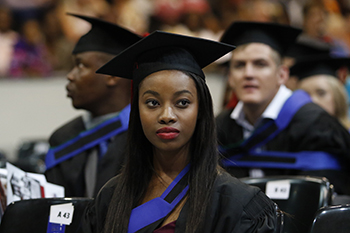Latest News Archive
Please select Category, Year, and then Month to display items
12 January 2024
|
Story Nonsindiswe Qwabe
|
Photo Sonia Small
 Since joining the UFS in 2008, Dr Grey Magaiza has worked extensively on approaches that can foster the socio-economic transformation of societies.
Since joining the UFS in 2008, Dr Grey Magaiza has worked extensively on approaches that can foster the socio-economic transformation of societies.
“The future should be one where communities can decide on their development agenda and futures. That’s the most important for me.” Dr Grey Magaiza, Deputy Director of the Centre for Gender and Africa Studies (CGAS) and Head of the Community Development programme on the Qwaqwa Campus, is passionate about capacitating communities to be agents of change and advancement. His vision for the future emphasises the empowerment of communities to take charge of their development by actively participating in decision making and the implementation of development projects that can improve their lives.
Since joining the UFS in 2008, Dr Magaiza has worked extensively on approaches that can foster the socio-economic transformation of societies. Over the years, he has crafted his research speciality into one that he is most proud of – being an interdisciplinary scientist immersed in the development of communities.
“I’m in a fortunate position of researching what I like. I say ‘fortunate’, because I’ve taken the time to understand what I’m passionate about, which is the overall field of rural livelihoods and livelihood futures – in short, community development. My research starts from an engaged university, understanding the elements that a university must use to enhance transformation and relevance to its immediate community in terms of development.”
One of the ways he has done this is by looking at social entrepreneurship as a development approach for young people in a rural setting. Through workshops with non-profit and civic organisations in Qwaqwa, Dr Magaiza has been helping these organisations to map out their needs and actively meet them through the involvement and support of external role players.
“We understand that communities are part of the national development agenda, but even that national agenda respects community knowledge and intentions and allows communities to shape their identity. A critical enabler of this is community organising. You bring back the capacity in communities to have dialogues on issues affecting them as spaces for engagement, knowledge exchange, and for people to just talk about their way forward.”
By enabling communities to define their development agenda, they can address their specific needs, challenges, and aspirations, he said. “When I look at livelihood futures, it’s quite an exciting aspect of my work – it’s like looking into a fortune tellers’ globe, because you’re not deciding for communities what they should do, but the communities themselves take those decisions.”
More than 500 to graduate this summer
2015-11-30

|
A total of 544 graduates will walk across the stage to collect their hard-earned qualifications at this year’s Summer Graduation on the Bloemfontein Campus.
A total of 106 Master’s Degrees and 39 Doctorates will be conferred by all seven faculties of the University of the Free State (UFS). About 231 pre-graduates are expected from the Faculty of Health Sciences. The School of Open Learning will proudly award 122 Diplomas and 46 Certificates.
Prof Busisiwe Rosemary Bhengu, Chairperson of the South African Nursing Council, will be the guest speaker for the day.
About the guest speaker
Prof Bhengu holds a PhD in Nursing, and is an Honorary Associate Professor at the University of KwaZulu-Natal (UKZN). From 2008, Bhengu has headed the UKZN School of Nursing. She has supervised and co-supervised several PhD and Master’s students.
In addition to teaching Critical Care Nursing at both local and international levels, Bhengu was responsible for the development of the Nurse Specialist syllabus at the university. Her contributions to the field reach as far as the United Arab Emirates, Kenya, Tanzania, Eritrea, Rwanda, and Seychelles, where she pioneered course development and implementation for critical care nursing in the curriculum for Nurse Anaesthetics in Rwanda.
Other leadership positions held by Prof Bhengu include directing the World Health Organisation Collaborating Centre in the UKZN School of Nursing between 2008 and 2011; representing the Afro-Region at the Executive Committee of the Global Network; chairing the Professional Conduct Committee; and the Laws, Practice and Standards Committee. She has published many papers internationally.
A musical prelude
The Sonnedou residence Kleinser group will deliver a few musical items for the graduates, friends, and family.
Details of event
Date: Thursday 10 December 2015
Time: 08:00am and 14:30pm
Place: Callie Human Centre, Bloemfontein Campus